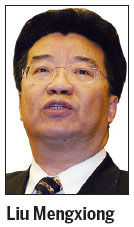Governing HK requires political thinking
Updated: 2012-10-12 07:11
By Liu Mengxiong(HK Edition)
|
|||||||||

The SAR government, headed by Chief Executive Leung Chun-ying, has been working hard in the three months since taking office to deliver the policy agenda of "seeking changes while maintaining stability with a measured proactive approach". Leung promised that approach during the Chief Executive Election campaign, and a great deal of effort will be spent on issues concerning living standards including housing and welfare.
The chief executive has impressed Hong Kong residents with his diligent, people-friendly, hard-working and efficiency-minded work style. However, Leung's team is good at administrative affairs but not so much in politics, as the politically-accountable senior officials and members of the Executive Council (EC) lack political awareness in general. Here lies the ultimate reason why the executive wing of the SAR government is currently the underdog.
The "One Country, Two Systems" formula is an unprecedented exercise and a politically-strong governing team can uphold the "One Country" premise and respect the differences between "Two Systems". Neither one should be favored over the other. Summing up Leung's government in the past three months, we can say the administration should recognize and understand the following:
I. Political thinking is crucial to safeguarding the "One Country, Two Systems" principle against attempts to make Hong Kong "non-Chinese" and holding the power to lead social opinions. In the past three months, all opposition parties and their proxies have been acting out old-fashioned McCarthyism and their version of Chen Shui-bien's "Taiwan independence" campaign.
The Civic Party has issued its "anti-red" battle cry, while its youth branch Scholarism leads the anti-national education offensive; the Democratic Party has called for "joint efforts to resist Communism"; People Power is screaming "down with the Communist Party of China" and the Hong Kong Federation of Students has demanded a "fight against colonization (by the mainland) and national education".
As the "One Country" principle came under fierce attack, Leung's administrative team could not even find the strength to speak its mind, let alone fight back. People could not understand why Leung managed to see for himself at Sheung Shui station of MTR and Chief Secretary Carrie Lam coordinated a multi-department drive to clamp down on parallel traders from the mainland, but made no comment on a sign board with "Chinese go back to China" written on it and the Union Jack popping up in the "Take Back Sheung Shui" protest rally. By failing to strike back against anti-Communism and "go non-Chinese" campaign, Leung's governing team showed us how politically-inept and rhetorically-handicapped it is.
II. Political thinking is crucial to distinguish between populism and popular will and firmly sticking to one's political ground. The Basic Law stipulates in Article 1: "The Hong Kong Special Administrative Region is an inseparable part of the People's Republic of China"; and Hong Kong "does not practice the socialist system or policies" in Article 5. This means the "anti-national education" movement initiated by Scholarism is nothing but a populist act against a historic trend and the "counter-brainwashing" mumbo-jumbo is but a wild shot in the dark.
Shockingly more than one key official from Leung's team publicly applauded Scholarism by calling its lead player "awesome" and "more progressive than our generation". That can only be seen as "confusing humans with the devil". And those comments served as a shot in the arm for those who camped outside the Government Complex, and whose numbers multiplied as a result. As core members of the SAR government, those officials sang praises of anti-patriot and anti-government behavior instead of upholding the right against the wrong. Such political ineptitude is sad indeed!
III. Political thinking is crucial to debunking indiscriminate politicization and facilitating the implementation of policies aimed at enhancing the economy and people's livelihood. It is a common understanding that the economy is the foundation while politics is the manifestation of the economy. Amid the rising fervor of indiscriminate politicization, it is impossible to be cost-effective in carrying out policies designed to boost the economy and living standards without political rationale.
For example, the northeast New Territories development plan is obviously a people-oriented policy aimed at correcting the outrageous situation of high land and residential housing prices and high rents that will help improve Hong Kong residents' housing conditions, not to mention the fact it will be a good distance from the boundary with the mainland. The opposition, however, has labeled it "a land concession and betrayal of Hong Kong" in an apparent attempt to demonize the cross-boundary economic integration and satisfy their urge to "go non-Chinese". Further proof of this mentality can be found in the display of the colonial-era "dragon and lion flag" and unfounded accusations such as "Wiping out Hongkongers."
Without exposing the opposition's political motive of presenting Hong Kong as an independent political entity, and tearing its intent to fan cross-boundary discord into pieces, it will be obstacles all the way for Leung's administrative team to implement its economic policies and efforts to improve the city's quality of life.
It's never too late to mend broken fences. Leung and his governing team must build up strong political awareness or find themselves under attack every step of the way in the next five years and opening the door for greater turmoil when it's time for direct elections of the Chief Executive and Legislative Council.
The author is a Hong Kong member of the CPPCC.
(HK Edition 10/12/2012 page4)